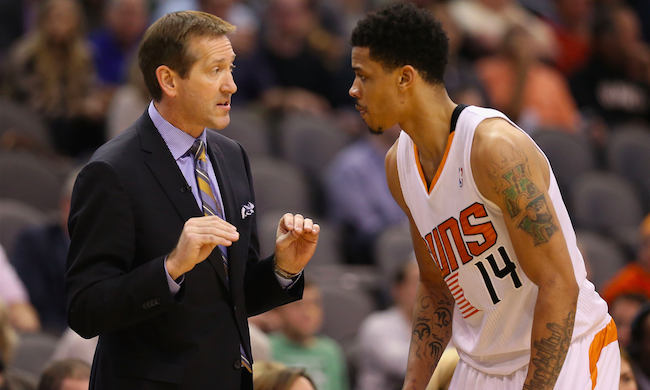
Some NBA players are worth an organizational headache. Gerald Green is not among them, but that obvious reality hasn’t stopped his agent from needlessly complicating his client’s fragile future with the Phoenix Suns.
After Jeff Hornacek pointed to the streaky journeyman’s underwhelming defensive performance this season as justification for a lack of playing time, agent Kevin Bradbury of BDA Sports ripped the Suns coach for “unfairly” throwing Green under the bus. Here’s Bradbury via Sporting News’ Sean Deveney:
“It’s completely unfair to misrepresent Gerald and his game like this,” Kevin Bradbury of BDA Sports told Sporting News. “You’re talking about a player that wants to win at any cost and is a tremendous locker guy and teammate. I don’t see the benefit for the coach to go about things this way.”
[…]
“The numbers show pretty clearly that Gerald is not the terrible defensive player he is being made out to be,” Bradbury said. “The Suns played him a lot last year, they liked what he brought, when he was rolling, the team was rolling, and no one was out there complaining about his defense.
“It’s unfortunate because the team isn’t where some people thought it would or should be at this point in the season. I’m not sure why that falls on one guy all of a sudden, especially when they have known all along what they have with Gerald. He can score, and can score a lot quickly, when you give him the minutes. He brings it on the defensive end, consistent with what the team brings as a unit. But when you hear the coach saying he is so bad that he can’t be on the floor? That’s nonsense. You have to wonder where that comes from and why.”
Bradbury’s incendiary comments come in response to Hornacek explaining Green’s reduced role in 2014-2015 following a breakout debut with the Suns last season.
The 29 year-old high-flier is averaging 19.5 minutes per game this season compared to a career-high 28.4 a year ago, and has notched eight DNP-CDs since January 30 – the first such game of his Phoenix tenure. And though Green has begun playing more this week, that extra court-time can be directly attributed to a season-ending injury suffered by trade deadline acquisition Brandon Knight.
Hornacek’s comments are below, courtesy of The Arizona Republic’s Paul Coro:
“He never really seemed to get it going and then it comes to the point where, if you’re not scoring and if your defense isn’t picking up, it’s hard to stay in the game,” Hornacek said.
“The next guy is going, ‘I needed help here and the guy wasn’t here.’ We’re trying to develop something for the future, not just being out here for everybody to play in the game. We want to get to a top-notch winning level and you’ve got to do it on both sides.”
That’s a pretty tepid assessment, especially considering Bradbury’s almost volatile reaction to it. But the agent has a job to do, after all, and that’s not only placating his client mentally, but also ensuring that Green’s value is high on the free agent market. Bradbury absolutely has an agenda here, and it’s a self-serving one, too.
But are Hornacek’s comments justified either way? We think so.
Green’s defensive rating of 105.8 is the highest of any Phoenix regular, and the team allows 1.5 fewer points per 100 possessions than its overall mark when he’s riding the bench. The players he’s guarding shoot 2.0 percent better than their average on the whole, becoming even more accurate with 10-feet of the hoop. The latter statistic only accounts for individual defense, too, and Hornacek suggests that Green’s defensive shortcomings are more related to team concepts than anything else.
The eye-test supports that idea. Green has quick feet and is wiry strong – when he’s engaged, he can certainly prove a handful for ballhandlers. The issues are that his full-fledged effort on that end is anything but consistent and his schematic understanding is sorely limited. Teams that move the ball side-to-side and force multiple helps kill Phoenix, and the presence of players who lack defensive nuance like Green helps explain why.
But basketball is a two-way game, of course, and his performance on the other end – the side where he’s supposed to make a very positive impact – has lagged behind 2013-2014’s. Though Green is shooting 34.9 percent from beyond the arc after knocking down 40 percent of his long balls last season, he’s hoisting up treys with an even greater frequency. Green is one of four regulars in the league to attempt at least 9.0 three-pointers per-36 minutes of play, and ranks last in accuracy among that esteemed quartet.
Below-average defense and inefficient chucking? It’s no wonder the 2007 Slam Dunk Contest champion has been given the playing time short stick.
The luster has worn off of Hornacek and the Suns. So much optimism gleaned from last season’s surprising run to playoff contention is all but gone, replaced by the team’s awful record in close games, a troubling penchant for technical fouls, and the stench of trading Goran Dragic and Isaiah Thomas under contentious circumstances.
But Green had finally found a career in Phoenix, and no sane person would have expected it to come without hiccups. It was just three years ago that he was in the D-League, and just two years ago that he was wasting away on the Indiana Pacers’ bench. Green isn’t a star or even reliable contributor in a vacuum, instead a player capable of making mostly positive contributions if things break his way.
That’s not happening right now, but that doesn’t mean it wouldn’t have with the Suns going forward. And given his agent’s misplaced remarks, it looks increasingly likely that Green will have to hope it does somewhere else in the future.






